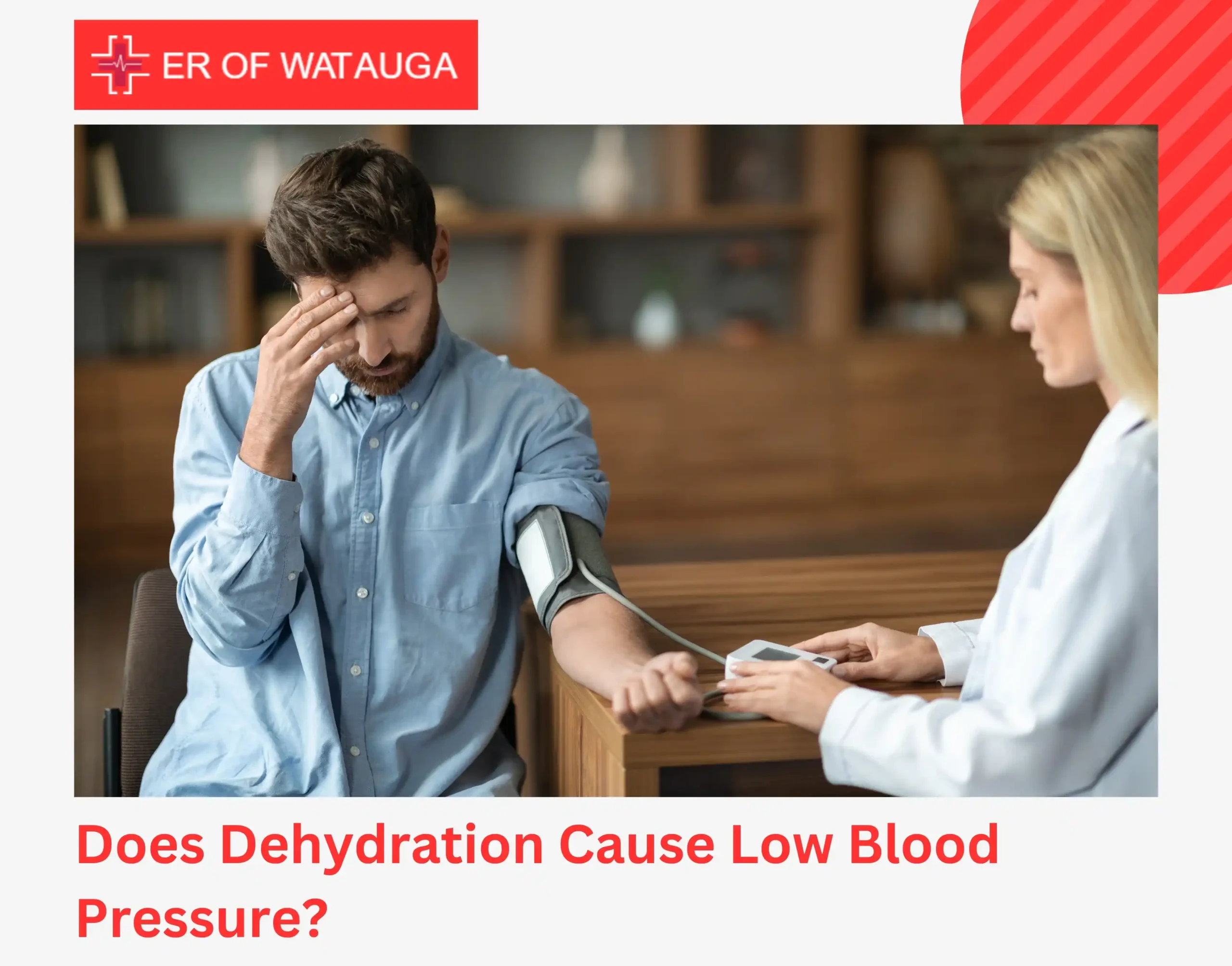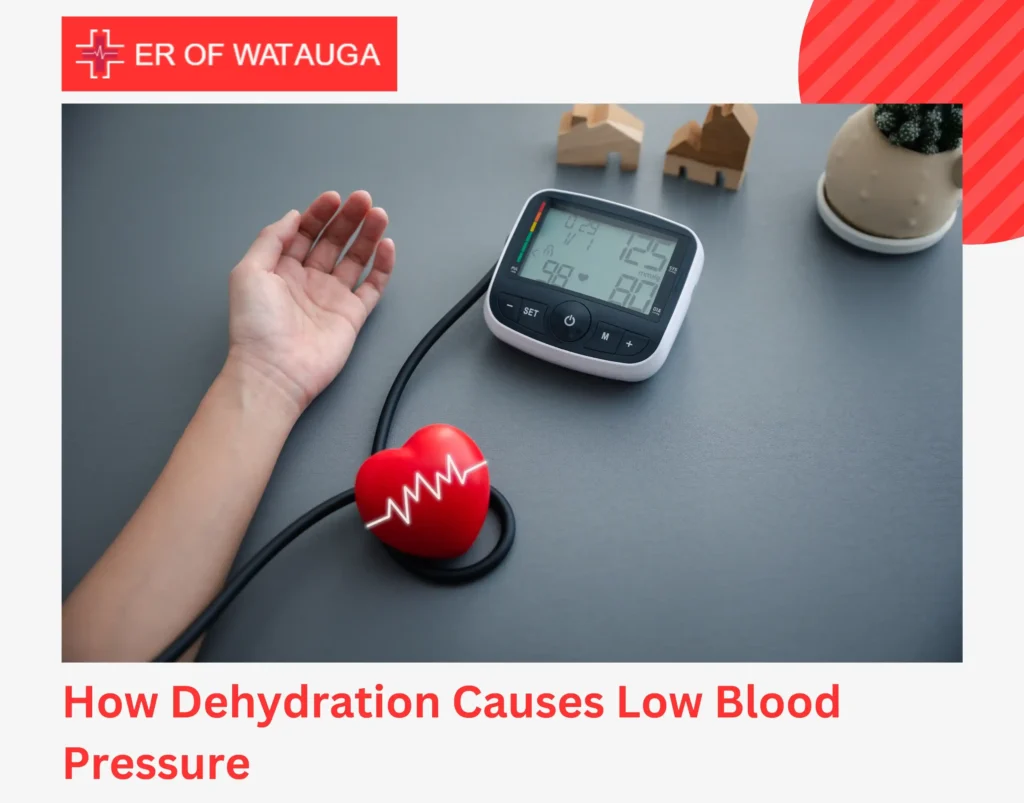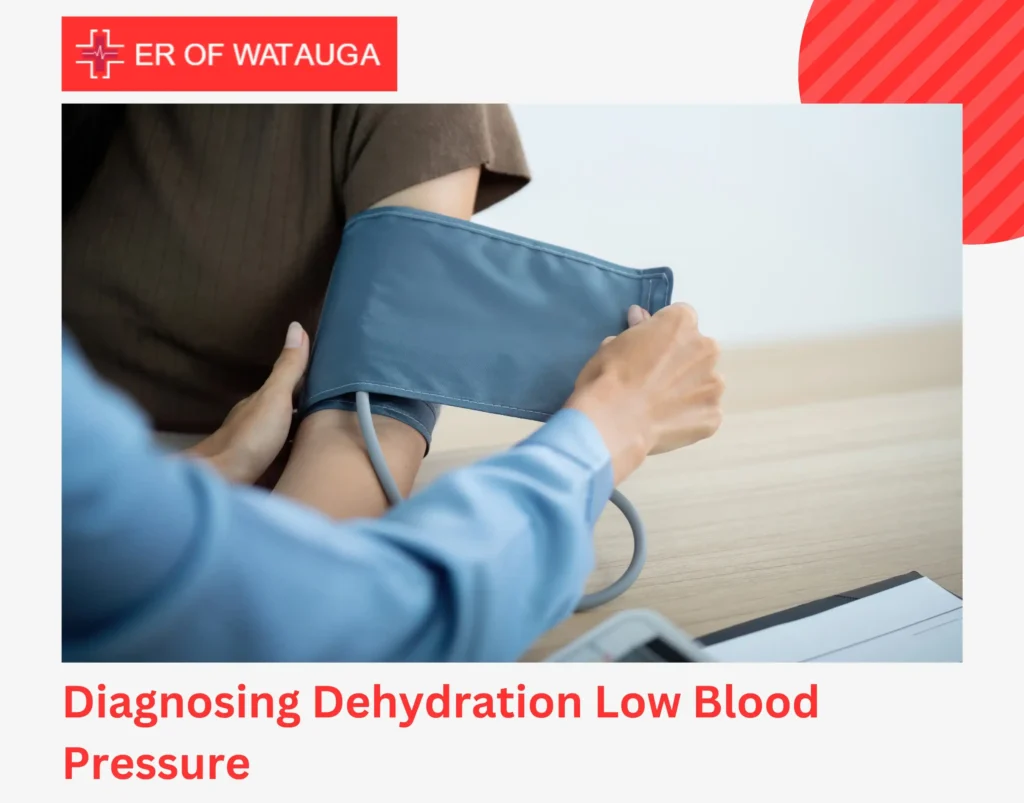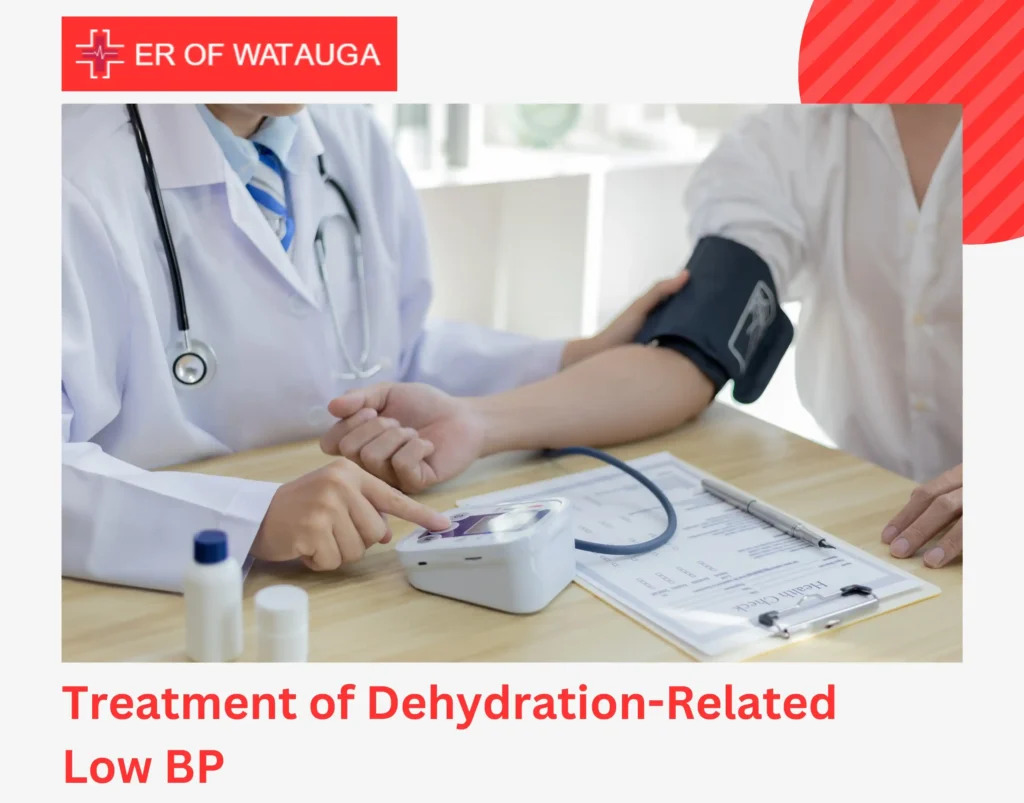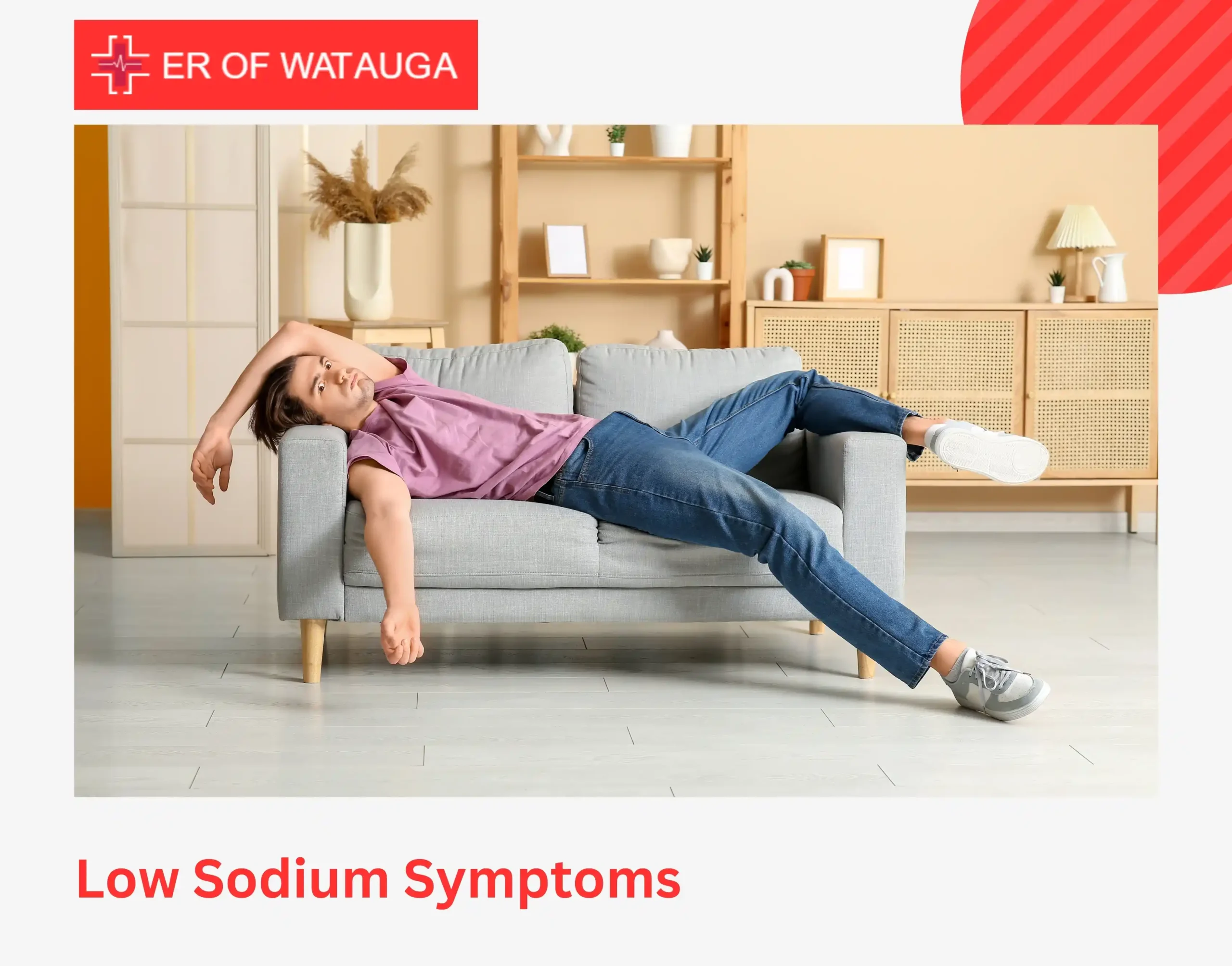You’ll be surprised to know that dehydration is one of the most common yet overlooked causes of low blood pressure. When your body doesn’t have enough fluids, it can’t maintain proper circulation. This results in less blood volume, which in turn lowers blood pressure.
It can be dangerous, sometimes leading to fainting, dizziness, or shock. Understanding the connection between dehydration and low blood pressure helps you catch the signs early and get timely treatment.
Let’s explore how dehydration affects blood pressure, symptoms to look out for, and strategies to prevent dehydration low blood pressure.
How Dehydration Causes Low Blood Pressure
Here’s how dehydration causes low blood pressure.
1. Reduced Blood Volume
Your blood is made up of plasma (mostly water), red and white blood cells, and platelets. When you’re dehydrated, plasma levels decrease, reducing overall blood volume.
2. Decreased Cardiac Output
When blood volume is low, the heart has less blood to pump with each beat (stroke volume decreases). This lowers cardiac output, which directly reduces blood pressure.
3. Impaired Electrolyte Balance
Dehydration often involves the loss of sodium and potassium. Sodium is crucial for maintaining blood volume and fluid balance. When sodium is depleted, the kidneys struggle to hold onto water, worsening fluid loss and hypotension.
Signs of Dehydration Low Blood Pressure
Common symptoms include:
- Dizziness or lightheadedness, especially when standing up
- Fainting (syncope)
- Blurred vision
- Fatigue or weakness
- Rapid heartbeat (compensating for low volume)
- Thirst, dry mouth, or decreased urination
- Cool, clammy skin
Severe dehydration can cause dangerously low blood pressure, which may progress to shock if untreated.
Other Low BP Causes
While dehydration is a major contributor, other causes of hypotension include:
- Medications (diuretics, beta-blockers, antidepressants)
- Heart problems (bradycardia, heart failure, heart valve disease)
- Endocrine issues (adrenal insufficiency, hypothyroidism)
- Blood loss from injury or surgery
- Sepsis (severe infection)
- Nutrient deficiencies such as vitamin B12 or folate
Knowing whether dehydration or another issue is responsible helps guide the right treatment.
Who Is Most at Risk of Dehydration Low Blood Pressure?
Certain groups are more likely to experience dehydration effects, leading to low blood pressure:
- Older adults have a reduced sense of thirst.
- Athletes lose large amounts of fluids through sweat.
- People in hot climates have an increased risk of fluid loss.
- Those with chronic illness, such as diabetes, kidney disease, or adrenal insufficiency.
- Individuals on diuretics – medications that increase fluid loss through urination.
How to Prevent and Manage Dehydration Low Blood Pressure
- Stay Hydrated: Aim for 8–10 glasses of water daily. Increase intake in hot weather or when exercising. Include fluids with electrolytes after heavy sweating.
- Balance Salt Intake: Sodium helps your body retain water and maintain blood pressure. Consult your doctor before adjusting salt if you have heart or kidney disease.
- Recognize Early Warning Signs: Don’t ignore dizziness, fatigue, or unusual thirst. Rest and drink fluids immediately if you notice symptoms.
- Avoid Alcohol and Excess Caffeine: Both can worsen dehydration and contribute to low BP.
- Adjust Posture Slowly: Standing up too quickly can cause a sudden blood pressure drop (orthostatic hypotension). Rise slowly, especially if you’ve been sitting or lying down for a long time.
When to Seek Medical Help
See a doctor if you:
- Have frequent dizziness or fainting episodes
- Experience ongoing fatigue or weakness
- Notice decreased urination or very dark urine
- Have chest pain, rapid heartbeat, or confusion
Seek emergency care if low blood pressure is accompanied by shock symptoms:
- Clammy skin
- Rapid breathing
- Loss of consciousness
Diagnosing Dehydration Low Blood Pressure
Doctors may use several approaches to determine if dehydration is causing hypotension:
- History and symptoms – recent vomiting, diarrhea, heat exposure, or poor fluid intake.
- Physical examination – dry skin, poor skin turgor, rapid pulse, low blood pressure on standing.
- Laboratory tests – blood electrolytes (sodium, potassium), kidney function tests, hematocrit (concentrated blood suggests fluid loss).
- Urine tests – dark, concentrated urine with low volume indicates dehydration.
Treatment of Dehydration-Related Low BP
The dehydration low blood pressure treatment depends on severity:
Mild dehydration
- Drinking water, clear fluids, or oral rehydration solutions (ORS with balanced electrolytes).
- Eating foods with natural salts and fluids like soups, fruits, and vegetables.
Moderate to severe dehydration
- Intravenous (IV) fluids: quickly restore fluid balance and stabilize blood pressure.
- Electrolyte replacement: corrects sodium and potassium levels if significantly imbalanced.
- Addressing the cause: treating diarrhea, vomiting, infections, or stopping fluid-draining medications if possible.
Final Thoughts
Dehydration is one of the most common and preventable low BP causes. By staying hydrated, watching for warning signs, and knowing when to get help, you can protect yourself from serious complications. If symptoms persist, consult your healthcare provider.
At ER Watauga, we provide rapid evaluation with on-site labs and imaging. Our team can give IV fluids and restore electrolytes to stabilize your dehydration low blood pressure. Whether it’s simple dehydration or something more serious, we’re open 24/7 to help you feel steady and safe again.
FAQs
1: What is low blood pressure?
Low blood pressure, also known as hypotension, occurs when your blood pressure drops below the normal range of 90/60 mmHg.
2: Can dehydration really cause low blood pressure?
Yes. Dehydration reduces blood volume, making it harder for the heart to pump effectively, which lowers blood pressure.
3: How much water should I drink daily to prevent dehydration?
Most adults should aim for at least 8–10 cups daily, but needs vary depending on activity level, climate, and health conditions.
4: Is salt helpful for low blood pressure?
In some cases, yes. Sodium helps retain water, raising blood pressure. Always consult your doctor before increasing salt intake.
5: Can children get dehydration low blood pressure?
Yes. Children are especially vulnerable, particularly during illness with vomiting or diarrhea.
6: What’s the fastest way to treat dehydration related to low BP?
Rehydrating with water and electrolyte solutions is the best immediate step. Severe cases may require IV fluids in the hospital.
